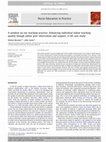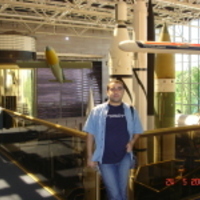Books by Shirley Bennett

With a wide international authorship and appeal, this research output reflects practitioner resea... more With a wide international authorship and appeal, this research output reflects practitioner research arising out of online support and teaching over a period of 10 years across a range of programmes within Further and Higher Education, Adult Learning and Professional Training contexts in across Europe. It is unique in combining innovative ideas for ready-made but adaptable activities proven as effective in promoting active learning online, together with explanation of the theoretical underpinnings and suggestions for further reading and personal action research. With an introductory theoretical overview and chapters devoted to different aspects of the online learning and teaching process, including contributions from elearning practitioners in 6 different countries reflecting the positive response of both teachers and learners, it provides guidance to educators setting up online programmes, and activities which can be used as they stand or as a departure point for development and independent work.
Further information at: http://tinyurl.com/yl6jk6v
Papers by Shirley Bennett
This chapter is part of an edited book focusing on the professional development of academics. It ... more This chapter is part of an edited book focusing on the professional development of academics. It contributes to the topic by focusing on how through C@N-DO, the University of Northampton ensures the quality of teaching and learning.
Journal of Adult and Continuing …, Jan 1, 2007
Current developments arising from the Bologna Process and impacting through - out European higher... more Current developments arising from the Bologna Process and impacting through - out European higher education trace their origins to the lifelong learning and widening participation agendas. They aim to facilitate new patterns and pathways of study and provide ...
Higher Education Academy EvidenceNet., 2010

This article provides a practical exploration of the conduct and outcomes a case study in which t... more This article provides a practical exploration of the conduct and outcomes a case study in which the process of peer observation in online learning and teaching is articulated and shown to be relevant to the enhancement of online learning and teaching in health and other educational contexts. Copious literature on the subject of peer observation and a small body about online peer observation suggests a variety of different approaches which lend themselves to the complexities of health education settings. The practical example described here was conducted in the UK. The authors, lecturers from two different departments in the same university, shared the new experience of online peer observation. Following face-to-face discussion of areas we wished each other to explore we undertook a documented review of a specific aspect of each others’ chosen learning activities. This led to further peer-support and discussion. The paper is illustrated with examples of our review and the discussion which followed which we hope will illuminate the process for other practitioners as well as stimulate research and further debate and discussion.

Peer observation is increasingly a feature of higher education (HE) practice. We argue that the p... more Peer observation is increasingly a feature of higher education (HE) practice. We argue that the principal drivers of quality assurance and professional development apply online as offline, given the growing importance of e-learning and related teacher development needs. Currently, discussion is largely restricted to traditional classroom-based contexts but this is non-tenable in the current climate of HE. The challenges and opportunities presented online add a particular colour to emerging issues concerning the nature of 'observation', the role of the 'observer' and factors influencing the effectiveness of peer observation. Paradoxically, the flexibility of the online medium also raises questions and forces decisions that we need not address face-to-face. Challenges include what is observable online, how the observation process is managed and structured online and how the experience relates to expectations. As online and blended learning continue to expand new peer observation guidelines will need to reflect such issues.

The importance of the lifelong learning and widening participation agendas can hardly be ignored ... more The importance of the lifelong learning and widening participation agendas can hardly be ignored in the climate in which higher education operates today. In attempting to reach out and involve non-traditional learners in higher education, e-learning has been held up as the ideal way to provide the anyplace-anytime study needed by adult returners to fit learning around the demands of work and family responsibilities. The suggestion sometimes seems to be that simply putting a course online to give flexibility of where and when people can study of itself provides the answer. Experience in face-to-face lifelong learning suggests that this is hardly likely to be the case and that access in this sense is only one part of the story.
This TQEF (Teaching Quality Enhancement Fund) project sought to explore the experience of adult returners involved in online learning through a case study examination of the experiences of students on the new foundation degree in Pre-16 Learning and Teaching Support which uses a virtual learning environment for the delivery of some modules of the programme and more generally for course support. Results from questionnaires, focus group discussions with staff and students and module evaluation are examined. A summary is given of the ways in which the findings of this work have informed programme and course design and delivery for the second cohort of students.
The Internet has had a considerable impact upon the way in which we teach and learn. The implemen... more The Internet has had a considerable impact upon the way in which we teach and learn. The implementation of the new information and communication technologies represents a significant challenge for all educational institutions and teaching professionals. It is, therefore, unlikely that anyone would question the need for effective programmes of staff development and training to support this significant culture change. This paper presents a case study that describes the design and implementation of a tutor-training programme for a group of tutors who are to become involved in online teaching. It identifies some key findings that will inform our future staff development and training programmes for prospective online tutors. It also provides an analysis of the effectiveness of the individual components of the programme of training to which the tutors were exposed.











Uploads
Books by Shirley Bennett
Further information at: http://tinyurl.com/yl6jk6v
Papers by Shirley Bennett
This TQEF (Teaching Quality Enhancement Fund) project sought to explore the experience of adult returners involved in online learning through a case study examination of the experiences of students on the new foundation degree in Pre-16 Learning and Teaching Support which uses a virtual learning environment for the delivery of some modules of the programme and more generally for course support. Results from questionnaires, focus group discussions with staff and students and module evaluation are examined. A summary is given of the ways in which the findings of this work have informed programme and course design and delivery for the second cohort of students.
Further information at: http://tinyurl.com/yl6jk6v
This TQEF (Teaching Quality Enhancement Fund) project sought to explore the experience of adult returners involved in online learning through a case study examination of the experiences of students on the new foundation degree in Pre-16 Learning and Teaching Support which uses a virtual learning environment for the delivery of some modules of the programme and more generally for course support. Results from questionnaires, focus group discussions with staff and students and module evaluation are examined. A summary is given of the ways in which the findings of this work have informed programme and course design and delivery for the second cohort of students.